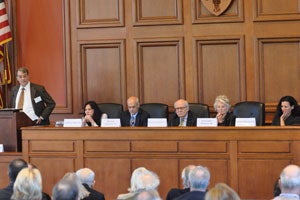Is the war on terror succeeding?
That was the question for an all-star panel of experts at Harvard Law School on Oct. 24. (View webcast)
Michael B. Chertoff ’78, who was appointed by President Bush as the second secretary of the U.S. Department of Homeland Security, told a packed Ames Courtroom gathering that he believes the effort has largely been a success. But he cautioned that international terrorism is still a grave threat.
“The intent by terrorists is as great as it was 10 years ago, seven years ago, three years ago,” he said. “The ability to carry out a threat, however, is less because we have in fact killed or captured a significant number of al-Qaeda leaders. But it’s a dynamic process. As they get hit, they try to recover and re-build.”
Meanwhile, he said, “what we have done to protect our infrastructure has made us significantly less vulnerable.”
But Congresswoman Jane Harman ’69 (D-Calif.) offered a more critical evaluation.
“I would argue that some of the things we’ve done, like Guantanamo, have been enormously counterproductive,” said Harman, who chairs the Homeland Security subcommittee on Intelligence and Terrorism Risk Assessment in the House.
“I think detention has been a total failure,” she said. “Clinging to Guantanamo has been a mistake. Insisting on calling people enemy combatants has been a mistake. Ignoring the Geneva Conventions has been a mistake. I can’t say anything good about detention decisions today since 9/11.”
HLS assistant law professor Gabriella Blum LL.M. ’01 S.J.D. ’03, who teaches the laws of armed conflict and counter-terrorism operations, reminded the audience that the U.S. is not the first nation to declare war on terrorism. Her home nation, Israel, did so at least a year prior to the U.S. and is “still calibrating and recalibrating its response, depending on the degree of the threat; it’s an ongoing process.”
Blum, who was an officer and counter-terrorism negotiator with the Israel Defense Forces, argued that the U.S. needs to re-think the role of law in the context of counter-terrorism.
“The law is not exhaustive in its determination of right and wrong,” she said. “There are going to be cases where we all believe that it is necessary to break the law, and at that emergency point we would expect the President to break the law.”
In addition, she said, “there are cases where the law will allow us to do things that we think of as immoral, irresponsible, and counter-productive.”
Counter-terrorism actions should be weighed realistically and not in black-or-white legal terms, Blum said.
One of the legal debates in the war on terror has been whether terrorists should be dealt with through the military justice system or through the criminal process. Chertoff said both models have their drawbacks—the criminal-justice approach has “very technical requirements under the Constitution” and the military-tribunal system is “harder to apply when you get away from the battlefield.”
He suggested that a “middle-ground approach” might best be called for and proposed that a commission be created to study the idea.
Panelist Lord William H. Goodhart ’58, a member of the House of Lords in Great Britain, said that the anti-terrorism approach in his country is distinctly different.
“We don’t see it as conducting a war,” he said. “We see terrorists in the UK as criminals, not as combatants.”
The panel, moderated by Professor Philip Heymann ’60, also included Juliette Kayyem ’95, chief homeland security officer for the Commonwealth of Massachusetts and acting executive director for research at the Belfer Center for Science and International Affairs at Harvard University’s Kennedy School of Government. Heymann and Kayyem are the co-authors of “Protecting Liberty in an Age of Terror.”
